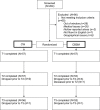Does a community-based stress management intervention affect psychological adaptation among underserved black breast cancer survivors?
- PMID: 25749598
- PMCID: PMC4411537
- DOI: 10.1093/jncimonographs/lgu032
Does a community-based stress management intervention affect psychological adaptation among underserved black breast cancer survivors?
Abstract
Background: In this randomized trial, Project CARE, we examined whether participation in a cognitive-behavioral stress management and breast cancer wellness and education program improved psychological outcomes among a sample of underserved black breast cancer survivors.
Methods: Both complementary medicine interventions were 10-sessions, manualized, group-based, and were culturally adapted for black women in the community from evidence-based interventions. Participants were 114 black women (mean age = 51.1, 27-77 years) who had completed breast cancer treatment 0-12 months before enrollment (stages 0-IV, mean time since cancer diagnosis = 14.1 months). Women were enrolled upon completion of curative treatment (ie, surgical, chemotherapy, radiation oncology) and randomized to receive cognitive-behavioral stress management or cancer wellness and education program.
Results: There was a remarkable 95% retention rate from baseline to 6-month follow-up. Participants in both conditions showed statistically significant improvement on indices of psychological well-being, including overall quality of life (Functional Assessment of Cancer Therapy-Breast), intrusive thoughts (Impact of Event Scale-Revised), depressive symptoms (Center for Epidemiologic Studies-Depression), and stress levels (Perceived Stress Scale) over the 6-month postintervention follow-up (all repeated measures analysis of variance within-subjects time effects: P < .05, except for overall mood; Profile of Mood States-Short Version). Contrary to hypotheses, however, condition × time effects were not statistically significant.
Conclusions: Findings suggest that improvements in multiple measures over time may have been due to intensive training in stress management, extensive provision of breast cancer information, or participation in an ongoing supportive group of individuals from a similar racial background. Implications bear on decisions about appropriate control groups, the timing of intervention delivery during the treatment trajectory, and perceived support from the research team.
© The Author 2014. Published by Oxford University Press. All rights reserved. For Permissions, please e-mail: journals.permissions@oup.com.
Figures




Similar articles
-
Contemplative self healing in women breast cancer survivors: a pilot study in underserved minority women shows improvement in quality of life and reduced stress.BMC Complement Altern Med. 2014 Sep 23;14:349. doi: 10.1186/1472-6882-14-349. BMC Complement Altern Med. 2014. PMID: 25249005 Free PMC article. Clinical Trial.
-
Psychosocial interventions addressing the needs of Black women diagnosed with breast cancer: a review of the current landscape.Psychooncology. 2015 May;24(5):497-507. doi: 10.1002/pon.3620. Epub 2014 Jul 17. Psychooncology. 2015. PMID: 25045105 Free PMC article. Review.
-
Effects of an expressive writing intervention on cancer-related distress in Danish breast cancer survivors - results from a nationwide randomized clinical trial.Psychooncology. 2013 Jul;22(7):1492-500. doi: 10.1002/pon.3193. Epub 2012 Sep 19. Psychooncology. 2013. PMID: 22991162 Clinical Trial.
-
Outcomes of an uncertainty management intervention in younger African American and Caucasian breast cancer survivors.Oncol Nurs Forum. 2013 Jan;40(1):82-92. doi: 10.1188/13.ONF.82-92. Oncol Nurs Forum. 2013. PMID: 23269773 Clinical Trial.
-
Home-based multidimensional survivorship programmes for breast cancer survivors.Cochrane Database Syst Rev. 2017 Aug 24;8(8):CD011152. doi: 10.1002/14651858.CD011152.pub2. Cochrane Database Syst Rev. 2017. PMID: 28836379 Free PMC article. Review.
Cited by
-
Stress Management Interventions to Facilitate Psychological and Physiological Adaptation and Optimal Health Outcomes in Cancer Patients and Survivors.Annu Rev Psychol. 2023 Jan 18;74:423-455. doi: 10.1146/annurev-psych-030122-124119. Epub 2022 Aug 12. Annu Rev Psychol. 2023. PMID: 35961041 Free PMC article. Review.
-
Psychological interventions for women with non-metastatic breast cancer.Cochrane Database Syst Rev. 2023 Jan 11;1(1):CD008729. doi: 10.1002/14651858.CD008729.pub3. Cochrane Database Syst Rev. 2023. PMID: 36628983 Free PMC article. Review.
-
Biobehavioral Pathways and Cancer Progression: Insights for Improving Well-Being and Cancer Outcomes.Integr Cancer Ther. 2022 Jan-Dec;21:15347354221096081. doi: 10.1177/15347354221096081. Integr Cancer Ther. 2022. PMID: 35579197 Free PMC article. Review.
-
Effects of neighborhood disadvantage on cortisol and interviewer-rated anxiety symptoms in breast cancer patients initiating treatment.Breast Cancer Res Treat. 2023 Nov;202(1):203-211. doi: 10.1007/s10549-023-07050-7. Epub 2023 Aug 10. Breast Cancer Res Treat. 2023. PMID: 37561280 Free PMC article.
-
Psychosocial protective interventions associated with a better quality of life and psychological wellbeing for African American/Black female breast cancer survivors: an integrative review.Support Care Cancer. 2022 Feb;30(2):1093-1114. doi: 10.1007/s00520-021-06425-0. Epub 2021 Aug 21. Support Care Cancer. 2022. PMID: 34417643 Free PMC article. Review.
References
-
- American Cancer Society. Cancer Facts & Figures 2013. Atlanta, GA: American Cancer Society; 2013.
-
- Aziz NM, Rowland JH. Cancer survivorship research among ethnic minority and medically underserved groups. Oncol Nurs Forum. 2002;29(5):789–801. - PubMed
-
- Chlebowski RT, Chen Z, Anderson GL, et al. Ethnicity and breast cancer: factors influencing differences in incidence and outcome. J Natl Cancer Inst. 2005;97(6):439–448. - PubMed
-
- Shavers VL, Brown ML. Racial and ethnic disparities in the receipt of cancer treatment. J Natl Cancer Inst. 2002;94(5):334–357. - PubMed
Publication types
MeSH terms
Grants and funding
LinkOut - more resources
Full Text Sources
Other Literature Sources
Medical

